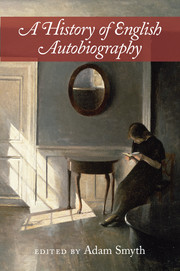Book contents
- Frontmatter
- Dedication
- Contents
- List of contributors
- 1 Introduction: The range, limits, and potentials of the form
- PART 1 AUTOBIOGRAPHY BEFORE ‘AUTOBIOGRAPHY’ (CA. 1300–1700)
- PART 2 RELIGION, GENDER, THINGS (CA. 1700–1800)
- PART 3 THE MANY NINETEENTH CENTURIES (CA. 1800–1900)
- 12 Working-class autobiography in the nineteenth century
- 13 Romantic life-writing
- 14 Nineteenth-century spiritual autobiography: Carlyle, Newman, Mill
- 15 Emerging selves: The autobiographical impulse in Elizabeth Barrett Browning, Anne Thackeray Ritchie, and Annie Wood Besant
- 16 Victorian artists’ autobiographies: Transgression, res gestae, and the collective life
- 17 Victorian print culture: Periodicals and serial lives, 1830–1860
- PART 4 RELATIONAL LIVES AND FORMS OF REMEMBERING (CA. 1890–1930)
- PART 5 KINDS OF COMMUNITY (CA. 1930-CONTEMPORARY)
- Index
- References
12 - Working-class autobiography in the nineteenth century
from PART 3 - THE MANY NINETEENTH CENTURIES (CA. 1800–1900)
Published online by Cambridge University Press: 05 March 2016
- Frontmatter
- Dedication
- Contents
- List of contributors
- 1 Introduction: The range, limits, and potentials of the form
- PART 1 AUTOBIOGRAPHY BEFORE ‘AUTOBIOGRAPHY’ (CA. 1300–1700)
- PART 2 RELIGION, GENDER, THINGS (CA. 1700–1800)
- PART 3 THE MANY NINETEENTH CENTURIES (CA. 1800–1900)
- 12 Working-class autobiography in the nineteenth century
- 13 Romantic life-writing
- 14 Nineteenth-century spiritual autobiography: Carlyle, Newman, Mill
- 15 Emerging selves: The autobiographical impulse in Elizabeth Barrett Browning, Anne Thackeray Ritchie, and Annie Wood Besant
- 16 Victorian artists’ autobiographies: Transgression, res gestae, and the collective life
- 17 Victorian print culture: Periodicals and serial lives, 1830–1860
- PART 4 RELATIONAL LIVES AND FORMS OF REMEMBERING (CA. 1890–1930)
- PART 5 KINDS OF COMMUNITY (CA. 1930-CONTEMPORARY)
- Index
- References
Summary
The earliest recorded use of the term that defines this volume is by a writer from a humble background. Ann Yearsley, the ‘Bristol Milkwoman and Poetess’, attached an ‘Autobiographical Memoir’ to the fourth edition of poems published in 1786 (Falke 2013, 12–3). By the end of the first quarter of the nineteenth century the genre of working-class autobiography had become sufficiently established to attract the attention of the literary establishment. In 1827 John Lockhart introduced the readers of The Quarterly Review to the new voice:
The classics of the papier mâché age of our drama have taken up the salutary belief that England expects every driveller to do his Memorabilia. Modern primer-makers must needs leave confessions behind them, as if they were so many Rousseaus. Our weakest mob-orators think it a hard case if they cannot spout to posterity. Cabin-boys and drummers are busy with their commentaries de bello Gallico; the John Gilpins of ‘the nineteenth century’ are historians of their own anabaseis; and, thanks to ‘the march of intellect’, we are already rich in the autobiography of pickpockets. ([Lockhart] 1827, 149)
The authors ranged from the obscure to the outcast. Amongst the ten texts arraigned for Lockhart's censure were The Adventures of a Ship-Boy; The Memoirs of John Nicol, Mariner; and The Life of David Haggart, alias John Wilson, Alias John Morison, alias Barney M'coul, alias John M'Colgan, alias Daniel O'Brien, alias the Switcher. Written by Himself, while under Sentence of Death. The blame for this corruption of English letters lay not just with the writers but with the marketplace. An epochal change was taking place in the realm of written intercourse. ‘There was … little danger of our having too much autobiography’, wrote Lockhart, ‘as long as no book had much chance of popularity which was not written with some considerable portion of talent, or at least by a person of some considerable celebrity in one way or another. But the circle of readers has widened strangely in these times … It seems as if the ear of that grand impersonation, “the Reading Public,” had become as filthily prurient as that of an eaves-dropping lackey’ ([Lockhart] 1827, 164).
- Type
- Chapter
- Information
- A History of English Autobiography , pp. 165 - 178Publisher: Cambridge University PressPrint publication year: 2016
References
- 1
- Cited by



